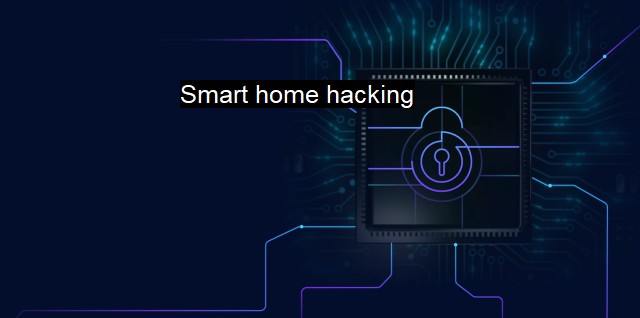What is Smart home hacking?
The Threat of Smart Home Hacking: Understanding the Risks and Context of Cybercriminal Activities in the World of Internet of Things (IoT)
Smart home hacking is a rapidly increasing cybersecurity threat that poses significant privacy and safety risks. As individuals increasingly integrate smart devices into their households, potential access points for hackers are becoming more widespread. It is a phenomenon wherein cybercriminals infiltrate network systems of a smart home to manipulate or monitor the activities within the devices.Smart home hacking explores the susceptibility of interconnected home gadgets or devices to unauthorized access, data intrusion, and malicious control. These gadgets include typical smart home devices such as connected thermostats, digital locks, home security systems, light bulbs, appliances, and even seemingly harmless tech like connected baby monitors and toys.
A smart home threat can be described as an infiltration by which cybercriminals gain access to a home network often via unpatched security loopholes in smart home technologies. Once inside, they can easily manipulate the gadgets, impervious to the homeowners. Often, the users remain unaware of the hack until the impersonated devices either malfunction or behave anomalously.
The hackers strive to intrude into personal data that might be contained within the devices, including banking details, medical information, or any other confidential inputs of identity. In graver situations, home routers can even be transformed into botnets to launch Distributed Denial of Service (DDoS) attacks on a larger scale. Thus, smart home hacking is not merely a violation of privacy but could potentially have far-reaching financial, legal, and even physical implications for the victims.
The concept of smart home hacking has gained global attention in part due to emerging narratives of hacked doorbells or baby monitor cams. The privacy compromises engendered by such incidents provide a dystopian glimpse of the harms of technologically advanced security-keys put into wrong hands. worst-case scenarios might include unauthorized individuals remotely locking or unlocking digital doors, controlling home appliances, or, chillingly, accessing security footages for criminal activities.
Various cybersecurity software companies, including renowned antivirus programs, are continuously adapting to mitigate such challenges. To stymie cybercrimes, they provide several features such as firewall enhancements, botnet protection, resistance to phishing attempts, and virus insulation. These powerful antiviruses work strategically to recognize and dissolve malware or hacker codes that might penetrate the home network. New cyber-defenses also include intrusion detection systems that alert homeowners about unusual behaviors and prevent unwanted manipulations.
Antivirus software manufacturers and cybersecurity experts recommend frequent software updates to ensure that any recently discovered system vulnerabilities are patched up. strong unique passwords for each device help reduce the risks brought upon by password leaks or breaches.
The era of smart home hacking reflects the emerging struggle between everyday conveniences and securing privacy in an interconnected digital world. Proactive cybersecurity measures--including antivirus protection, robust user discretion, and staying abreast with updates--are pivotal in securing smart home environments from potential cyber threats. As we move forward, creating a safe digital world for smart homes requires continuous innovation and the development of advanced security protocols and software alike.

Smart home hacking FAQs
What is smart home hacking?
Smart home hacking is a type of cyber attack where a hacker gains unauthorized access to a smart home device or network to steal personal information or take control of the devices.What are the risks associated with smart home hacking?
Smart home hacking can result in the loss of personal data, financial loss, physical harm, and invasion of privacy. The hacker can gain access to sensitive information, such as passwords or bank account details, and can also control the smart home devices, such as the thermostat, security cameras, and door locks.How can I protect my smart home from hackers?
To protect your smart home from hackers, you should use strong passwords, update your devices' firmware regularly, avoid public Wi-Fi networks, use antivirus software, segment your home network, and enable two-factor authentication. You should also be careful about the apps and devices you use and ensure that they have proper security measures in place.What should I do if my smart home has been hacked?
If your smart home has been hacked, you should immediately disconnect the affected devices from the network and change your passwords. You should also notify your internet service provider and the manufacturer of the hacked device. Additionally, you should run a malware scan on your devices and update your firmware. It is important to take preventive measures to avoid future attacks, such as implementing stronger security measures and monitoring your network more closely.| | A | | | B | | | C | | | D | | | E | | | F | | | G | | | H | | | I | | | J | | | K | | | L | | | M | |
| | N | | | O | | | P | | | Q | | | R | | | S | | | T | | | U | | | V | | | W | | | X | | | Y | | | Z | |
| | 1 | | | 2 | | | 3 | | | 4 | | | 7 | | | 8 | | |||||||